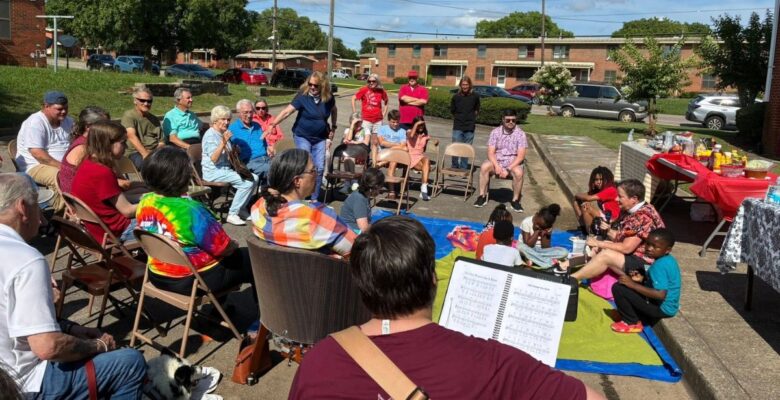Few will remember it—and fewer still will believe it—but when I was a seminarian at Virginia Theological Seminary, I was president of the Rosary Society. Raised from birth in high church, among smells and bells and all manner of chanted prayers, I went to seminary imagining that I would become the rector of an inner city, Anglo Catholic parish just like the one that had formed me as a follower of Jesus.
Planting “The Abbey”
Five years later, I was planting The Abbey, the newest and least traditional church plant in the history of the Episcopal Diocese of Alabama. Rather than a “traditional” church model, we opened a religious coffee shop that provided space for discipleship, worship, community, and generosity. While a few ornery Episcopalians accused me of “desecrating” the altar (by failing to prevent unwitting guests from using it as a coffee table), we heard from many others that the work we were doing at The Abbey had invited them to see and understand sacrament in a new and richer way.
This was partly because our coffee shop church format was so dislocating that it forced folks to look for God in strange places, which, it turns out, were actually very ordinary places! In a mug of coffee, rather than in a chalice of wine. Talking and laughing with the guest sitting next to you at the bar, rather than a handshake at The Peace.
But this isn’t the whole story. Even being part of a more traditional church plant is highly meaningful and transformative. My husband’s parish was planted 35 years ago, and the few remaining founding members still talk about the early years: worshipping in mobile units and hearing the toilet flush during Eucharistic Prayer A. Somehow the thinness of the walls wasn’t a distraction; it was a mild hardship that rooted them in relationship with each other, with God, and with the true purpose of being together as a gathered people of faith. It was a spiritual adventure!
Can Tradition and Adventure Coexist?
I love The Episcopal Church, but I’m not sure “adventurous” is how I would describe us. In my experience serving in the Bible Belt, many Episcopal converts have come from conservative traditions and they appreciate The Episcopal Church precisely because it is high on tradition and low on evangelistic activity.
When we started The Abbey, friends from neighboring Episcopal churches wanted to support the ministry. Most loved worshipping in the coffee shop—once or twice. “This is so different! You worship around a coffee table, just like Jesus!” they would say.
But after three visits, during the last of which a stack of foldable metal chairs crashed to the floor like a set of dominos during communion, one friend said to me, “I love you. I love the mission of this church plant. But this is just too much chaos for me to feel worshipful.”
That perspective is okay on an individual level. But the challenge becomes: How then do we reach people who may be really blessed by The Episcopal Church or who might have a blessing for us? How do we reach such people if they don’t feel connected to our liturgy and buildings or don’t feel they have access to them because of location or even race or class?
This is our responsibility. We are the hands and feet of Christ. And we are the hands, feet, and voices of the church.
Stretching into Adventurous Leadership
I don’t want to do away with Episcopalians’ favorite traditions—not entirely. But I have suggestions for how we might stretch our hearts and imaginations in a way that could help us develop capacity for adventurous leadership and church planting.
1. Look for sacraments outside the church
Remind people that sacraments are “outward signs of inward grace.” Send people out to their neighborhoods, schools, and work places with this question: “Where do I see sacrament in action, outside the church?”
2. Meet in spaces beyond your church building
Host church meetings and formation events outside the walls of your church. Visit public spaces and ask how God might be present there. Visit other church traditions and talk about how the Spirit showed up.
3. Explore your neighborhood
Offer a weekday neighborhood assignment: Walk your neighborhood or the church neighborhood, and maybe pick a place to hang out for an hour. Visit a shop you’ve never been to before. Talk to three strangers.
4. Learn from the past
Offer formation events about times in history when the church has been forced out of its tradition for the sake of mission. One example is when Rev. John Yamazaki conducted services in the barracks of the Japanese Internment Camps.
5. Become marginalized includers
Most are familiar with Henri Nouwan’s phrase “the wounded healer.” Talk about what it means to be a marginalized includer. We need leaders who have carefully examined their own story and can use this to relate to others on the outskirts of society and the church.
6. Reflect on healthy community
Invite people to reflect on the practices of a healthy church community. In a time of increased isolation and loneliness, we need leaders who have both experienced community and can nurture it.
7. Examine discomfort
Explore discomfort and dislocation. When does God call us to sit in uncomfortable conversations, unpredictable situations, or disruptive experiences? We’ve all placed ourselves in these situations for the sake of love at one time or another. Could we do it for the sake of inviting new people to join with us in the body of Christ?
By honing these practices, I am convinced that we can nurture the next generation of Episcopal church planters and missional leaders!
Featured image of The Abbey community in Alabama worshipping outside in their neighborhood is provided by the article author, Katie Nakamura Rengers

